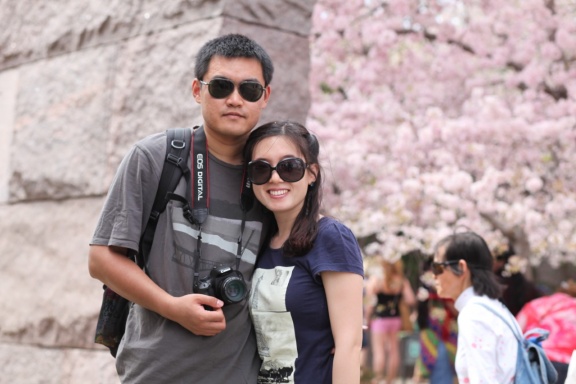This week we are excited to feature one of our postdoctoral fellows from the Center for Quantitative Sciences within the Department of Biostatistics. Dr. Yu Wang has had experience in both bioinformatics and biostatistics and is involved in some fascinating research. Read on to learn more...
Tell us about your current research focus.
By developing and adopting relevant bioinformatical and biostatistical methods on NGS and clinical data, my work is mainly focused on parsing genetic, transcriptomic, and immunogenetic features associated with response to anti-PD-1 and/or anti-CTLA-4 immunotherapy in patients with malignancies, and developing biomarkers by combining different features to help discriminate patients for choosing more reasonable therapy strategy.
It’s a very challenging and hot topic with significant breakthrough in cancer therapy. I feel excited and lucky to be involved. I set up pipelines for immunogenetic signature evaluation, immune cell composition and neoantigen prediction by integrating WES, RNAseq and SWATH-MS proteomical data. By cooperating with our collaborators, we combine multidimensional data from the somatic mutation and expression profiles, to immunogenetic features in TILs, to depict the key players associated with the response to immune checkpoint blockade therapy and clinical outcomes.
What was your draw to statistics and/or Vanderbilt?
Even though I am working with a lot of biological and clinical data daily, I am still a beginner in biostatistics. I really appreciate the environment provided by our department. I can learn a lot of statistics from our colleagues, courses, workshops, etc. I realize that not only the concepts and methods but also the way of thinking in biostatistics is critical for data science. I cherish the opportunities of being surrounded by the experts, and I hope I can add the cannon into my armory.
Tell us about your publications and research findings.
My most recent first author manuscript was sent out for reviewing and in that manuscript we show that rare mutations in antigen processing machinery are associated with high mutational burden and an enhancement of predicted neoantigens, providing insights into the mechanisms of high mutation burden in some patients. I had previously published about 20 papers in plant science before I joined VUMC. After I transferred to the biomedical research field, I participated as a co-author in several publications in biomedical/clinical journals, like Nature Genetics, NPJ Breast Cancer, JCI Insight, bioRXiv etc.
What makes Vanderbilt special in your experiences of collaborating with others?
It’s actually my favorite part about working in CQS/Biostatistics/VUMC. With Dr. Xu's help, I am able to be focused on a specific and challenging topic with many active collaborators who work in cancer cell biology, cancer immunology and in the clinic at VUMC. They are all immunotherapeutic experts and can provide valuable data and suggestions. I can always count on help from my colleagues in many ways and know who to turn to for help with questions I have pertaining to NGS data analysis, cloud computing, REDCap and many other areas. The atmosphere of collaborating is critical for personal development as a researcher in interdisciplinary fields, like bioinformatics, and for trying to make efforts to study complex diseases.
Tell us about your life outside of Vanderbilt. Do you have a significant other? Children? Pets? What about your hobbies? What are your goals for the future?
Music, cuisine and basketball feed my body and soul. The Spurs with Tim Duncan is my favorite team. I have been married to my wife for eight years. She was my classmate in college and is currently pursuing a MS’s degree in Biostatistics. We really hope to add new members to our home soon; I had a German shepherd when I was in high school and we plan to adopt a puppy next year.
Finally, what is something about you that most people at Vanderbilt still don't know about you? (Until now, of course!)
Well, this is a good opportunity to explain how to pronounce my first name “Yu”. It’s totally fine for me if you say it as ‘/ju:/’, like in “Thank you”. But if you want to know something about Chinese language or just for fun, here are tips. Some of you may know that there are many Chinese characters. Each character has a sound (some have multiple). And for each sound, there are four tones. The “u” here is a vowel which is not exist in English (that is why it’s difficult for native English speakers and it is actually written as “ü”). Here is a link of explaining how to pronounce it. Here is an example on YouTube. My name is the fourth tones. Try it!
